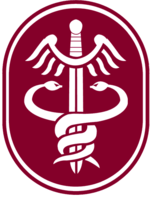Armed Forces Research Institute of Medical Sciences
The Armed Forces Research Institute of Medical Sciences — known as AFRIMS — is a United States Army project that started as a collaboration with the government of Thailand to fight a cholera outbreak in Bangkok in 1958 and '59. It subsequently expanded to cover military medical research projects (primarily involving infectious diseases) across much of Southeast Asia and the Indian Subcontinent.[1]
Mission and history
The mission of the US Army Medical Component of the Armed Forces Research Institute of the Medical Sciences (USAMC-AFRIMS) is to conduct basic and applied research for development of diagnostic tests, drugs and vaccines for infectious diseases of military importance. First formed as the SEATO Lab following the 1956-8 Cholera pandemic, USAMC-AFRIMS is an agency of the US Embassy Thailand residing at the Royal Thai Army Medical Center in Bangkok. AFRIMS is a special foreign activity of the Walter Reed Army Institute of Research (WRAIR) and part of the Military Medical Research and Material Development Command (MRMC). AFRIMS is one of the largest pieces of a global network of US Department of Defense Overseas Medical Research Laboratories located in Jakarta, Indonesia; Lima, Peru; Nairobi, Kenya; Cairo, Egypt. USAMC-AFRIMS has nearly 300 staff members (Thai and USA) and a research budget of approximately $5–7 million annually.[2]
Research
The major infectious disease threats to soldiers in South East Asia include drug resistant malaria, diarrhea and dysentery, dengue fever, HIV, hepatitis, and scrub typhus. These agents pose health risks to soldiers as well as to the civilian population, and thus form the major areas of research at AFRIMS. Research is predominantly applied research aimed towards finding, developing and testing new drugs and vaccines. New medications currently under development are for the treatment and prevention of multiple drug resistant malaria. Vaccines for dysentery, dengue fever, hepatitis E and HIV are also under development at AFRIMS. Products originally field tested or developed at AFRIMS include Hepatitis A Vaccine, Japanese B Encephalitis Vaccine, doxycycline prophylaxis for malaria, mefloquine antimalarial drug prevention, and halofantrine antimalarial drug treatment.[2]
AFRIMS also conducts surveillance of emerging diseases such as drug resistant P falciparum malaria, Diarrhea agents: Campylobacter, Cholera O139, Cyclospora, E coli, Hepatitis E, HIV 1 E clade, drug resistant scrub typhus, dengue hemorrhagic fever, and influenza. The laboratory has over 30 field sites in Thailand, Nepal, Cambodia, Vietnam and Bangladesh. AFRIMS also has the largest medical library in Southeast Asia and a modern research animal facility, which is accredited by the Association for the Assessment and Accreditation of Laboratory Animal Care, International (AAALAC).[2]
References
- ↑ "AFRIMS: History of AFRIMS". www.afrims.org. Retrieved 2016-01-22.
- 1 2 3 "US Army Medical Component of the Armed Forces Research Institute of the Medical Sciences (USAMC-AFRIMS)". United States Foreign Service. Retrieved January 23, 2016.
 This article incorporates text from this source, which is in the public domain.
This article incorporates text from this source, which is in the public domain.
